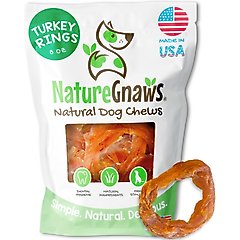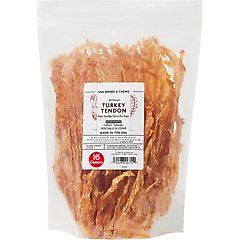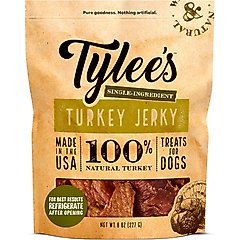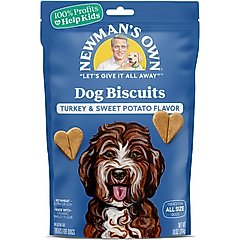Can Dogs Eat Turkey?
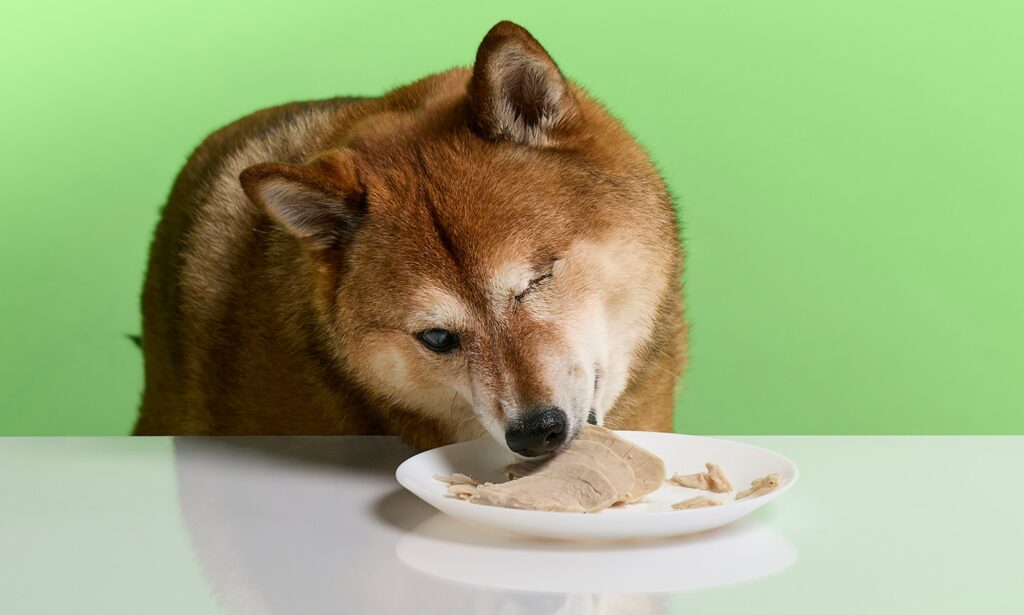
Photo by Chewy
Turkey is often included in dog food, but is it safe to give your pup a piece of turkey from your plate? Can dogs eat turkey?
While turkey is safe for dogs (and can be good for them too), it doesn’t mean you should go overboard with the table scraps.
We talked to two veterinary experts about the benefits and risks of turkey for dogs, how to safely feed turkey to dogs, and more.
Before introducing any new food into your dog’s diet, always check with your veterinarian.
Key Takeaways
- Yes, dogs can eat plain, cooked turkey—especially skinless, boneless white meat—as a high-protein, low-fat treat.
- Avoid giving dogs seasoned turkey, skin, or bones, as these can cause digestive upset, choking hazards, or internal injuries.
- Turkey contains beneficial nutrients, including amino acids, vitamins B and D, and minerals like zinc and selenium, which support your dog’s health.
- Stick to small portions—turkey should make up no more than 10% of your dog’s daily caloric intake, with the rest coming from a balanced dog food.
Can Dogs Have Turkey?
Yes, dogs can have turkey—with some caveats. While plain, cooked turkey breast is generally safe and healthy for dogs, some parts of the bird aren’t, including:
- Turkey that’s been seasoned or cooked with garlic, onions, butter, or spices
- Turkey bones, especially cooked turkey bones, which are brittle and can easily splinter—posing a major choking hazard or causing intestinal blockages or tears
Lean, white meat from the turkey breast is the best option. It’s lower in fat and easier for your dog to digest. Dark meat is OK in small amounts, but it’s higher in fat and calories, which can lead to stomach upset or even pancreatitis in some dogs.
Is Turkey Good for Dogs?
Yes, turkey is good for dogs in moderation. Here are some health benefits of adding turkey to your dog’s diet:
- It’s lean and high in protein. Turkey is a good source of high-quality protein, which is essential for muscle development, repair, and overall growth in dogs, according to Bethany Hsia, DVM, veterinarian and co-founder of CodaPet in Clovis, California. And just like with humans, high-protein foods may help your dog feel full and satisfied.
- It’s low in fat. Skinless turkey is lower in fat than other forms of meat (like ham, for example), so your dog’s gastrointestinal system can tolerate it better, and it’s less likely to cause digestive issues. This also makes it more suitable for dogs on a low-fat diet or those prone to weight gain, says Dr. Hsia.
- It’s rich in vitamins and minerals. Turkey is a good source of amino acids, zinc, selenium, magnesium, niacin, potassium, phosphorus, and B vitamins, which are vital to maintain your pet’s health. Together, these nutrients can provide energy; help maintain a well-conditioned coat; support muscle and nerve function; and aid heart and bone health.
- It’s highly motivating. Leslie Sinn, DVM, DACVB, CPDT-KA, certified personal trainer and founder of Behavior Solutions in Ashburn, Virginia, says turkey is also a highly motivating food, because most dogs find it delicious. Because of this, it can be used as a dog treat to help with training.
Is Turkey Bad for Dogs?
But what about the risks? Is turkey bad for dogs? Turkey meat itself doesn’t come with inherent risks, according to Dr. Sinn; the risks mostly come from the bone. That said, there are still some things to be mindful of:
- Dark meat can lead to upset stomach or pancreatitis. Dark meat (and the skin) is higher in fat and calories than white meat. High-fat foods are harder on your dog’s digestive system and more likely to cause health problems, like an upset stomach or pancreatitis (inflammation of the pancreas).
- Your dog may be allergic. There’s also the potential for food allergies, says Dr. Hsia. While a turkey allergy in dogs is rare, it is possible. Watch for itchiness, vomiting, and/or excessive biting and scratching of the paws and skin.
- The bones can be a choking hazard. Similar to chicken bones, turkey bones can easily splinter, which can cause choking, intestinal blockages, or internal injuries.
How Much Turkey Can My Dog Eat?
Turkey should be considered a treat, not a regular part of your dog’s daily meals. All treats combined should make up no more than 10% of your dog’s overall diet, with the remaining 90% coming from a complete and balanced dog food.
How much that 10% actually amounts to depends on your dog’s size. Here’s a general guide:
| Dog Size | Serving Size | Frequency |
|---|---|---|
| Extra-small dogs (2–10 pounds) | 1/2 ounce | Daily |
| Small dogs (11–20 pounds) | 1 ounce | Daily |
| Medium dogs (21–50 pounds) | 2 ounces | Daily |
| Large dogs (51–90 pounds) | 2.5 ounces | Daily |
| Extra-large dogs (91+ pounds) | 3 ounces | Daily |
Keep in mind these are rough estimates, and it’s always best to check with your vet for personalized feeding recommendations, especially if your dog has underlying health issues or food sensitivities.
How To Safely Feed Turkey to Your Dog
When it comes to feeding your dog turkey, the key is keeping it plain and simple. Here are preparation tips to follow when feeding turkey to dogs, according to Dr. Sinn:
- Stick to lean meat. Dark meat is higher in calories and fat, which can be harder for your dog to digest and can throw off their normal diet.
- Remove the turkey skin and bones. The skin is high in fat, and the bones can splinter and cause serious health issues.
- Serve only plain, unseasoned turkey. Avoid salt, dressings, marinades, and spices like garlic and onion, which can be toxic to dogs.
- Don’t serve raw turkey. Raw-food diets can increase the risk of food poisoning from bacteria like salmonella, so cook the turkey thoroughly before giving it to your dog.
Once the meat is properly prepped, you can offer turkey on its own as an occasional treat or mix it into your dog’s regular food for a protein boost.
Homemade Dog Treats With Turkey
If you want to get a little more creative, you can also make your own homemade dog treats. Here are a few of our favorite turkey-based options:
Store-Bought Dog Treats With Turkey
Another easy option is to give your dog store-bought treats that have turkey as a main ingredient. The following are some pet-parent favorites:
Recommended Products
My Dog Ate Too Much Turkey—What Do I Do?
If your dog ate more turkey than they should have, monitor them closely for any signs of discomfort or distress. Too much—especially with skin, bones, or fatty parts—can cause issues like digestive upset or pancreatitis.
Here are some common symptoms to watch for:
- Vomiting or diarrhea
- Abdominal pain
- Lethargy or unusual tiredness
- Loss of appetite
- Bloating or abdominal swelling
If you notice any of these signs, call your vet. They may recommend bringing your dog in for an evaluation or treatment.
FAQs About Turkey for Dogs
Can puppies eat turkey?
Yes, puppies can eat plain, cooked turkey in small amounts as long as it’s boneless, skinless, and unseasoned. Avoid giving them turkey with bones, skin, or any added spices or sauces.
Can dogs eat ground turkey?
Yes, dogs can eat ground turkey as long as it’s lean and cooked thoroughly without any seasonings or additives, according to Dr. Hsia. High-quality ground turkey has the same vitamins and minerals as regular turkey meat, so it also provides the same health benefits.
Can dogs eat turkey sausage?
Vets don’t recommend it. Turkey sausage is typically high in salt and fat and may contain spices that can upset their stomach or be harmful.
Can dogs eat turkey bones?
No, you should not give your dog turkey bones. Bones can pose a choking hazard or cause internal injuries in the digestive tract. Cooked poultry bones are especially brittle, so they’re more likely to break into small pieces.
Can dogs eat turkey bacon?
It’s best to avoid giving turkey bacon to dogs. It’s often highly processed and may contain additives, Dr. Hsia says.
Can dogs eat turkey necks?
Dr. Sinn advises against dogs eating turkey necks. Even though they’re slender, Dr. Sinn cautions there’s always a chance that a fragment or piece of bone can splinter and cause problems.

